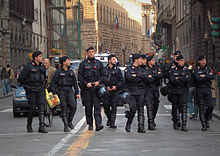
Back Gendarmerie Afrikaans درك Arabic Jandarmeriya Azerbaijani Жандармерыя Byelorussian Жандармэрыя BE-X-OLD Жандармерия Bulgarian Žandarmerija BS Жандармери BXR Gendarmeria Catalan Četnictvo Czech
This article needs additional citations for verification. (September 2009) |


A gendarmerie (/ʒɒnˈdɑːrməri, ʒɒ̃-/) is a military force with law enforcement duties among the civilian population. The term gendarme (English: /ˈʒɒndɑːrm/) is derived from the medieval French expression gens d'armes, which translates to "men-at-arms" (lit. 'people of arms'). In France and some Francophone nations, the gendarmerie is a branch of the armed forces that is responsible for internal security in parts of the territory (primarily in rural areas and small towns in the case of France), with additional duties as military police for the armed forces.[1] It was introduced to several other Western European countries during the Napoleonic conquests.[2] In the mid-twentieth century, a number of former French mandates and colonial possessions (such as Lebanon, Syria, the Ivory Coast and the Republic of the Congo) adopted a gendarmerie after independence.[3][4] A similar concept exists in Eastern Europe in the form of Internal Troops, which are present in many countries of the former Soviet Union and its former allied countries.
- ^ Lioe, Kim Eduard (2010). Armed Forces in Law Enforcement Operations? – The German and European Perspective (1989 ed.). Springer-Verlag Berlin Heidelberg. pp. 52–57. ISBN 978-3-642-15433-1.
- ^ Emsley, Clive (1999). Gendarmes and the State in Nineteenth-Century Europe. Oxford University Press. pp. 52–57. ISBN 978-0198207986.
- ^ Deep, Daniel (2012). Occupying Syria Under the French Mandate: Insurgency, Space and State Formation. Cambridge University Press. p. 204. ISBN 978-1-107-00006-3.
- ^ Clark, John; Decalo, Samuel (2012). Historical Dictionary of Republic of the Congo. Lanham: Scarecrow Press. pp. 44–49. ISBN 978-0-8108-7989-8.
© MMXXIII Rich X Search. We shall prevail. All rights reserved. Rich X Search